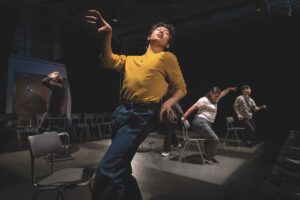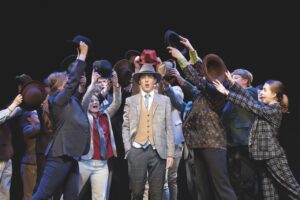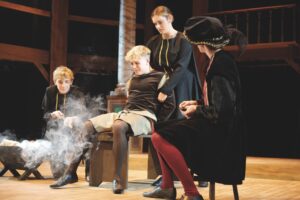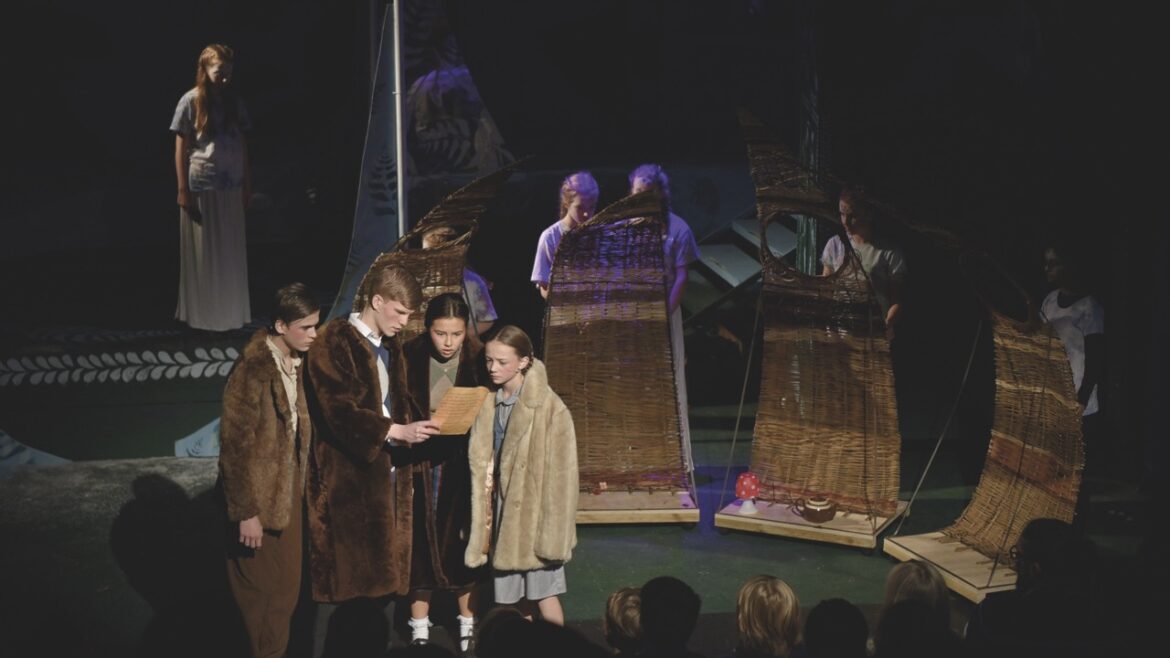Charlotte Phillips finds out how local schools are bucking a trend by encouraging young people to experience, embrace and advance in the performing arts
As the take-up of drama declines at GCSE and A-level, it seems young people are finding it harder to get started in the profession, with the live entertainment industry now noticing a knock-on effect on staffing levels.
It’s not that performing arts have lost their appeal. One survey by Ravensbourne University London found that three-quarters of 18- to 25-year-olds are drawn to the creative industries as a career. What they lack currently is a clear pathway to help them get there.

Image by Cambridge School of Visual & Performing Arts (CSVPA)
Is this a picture that performing arts specialists in our local schools and colleges would recognise? Well, yes and no. The decline in students studying music and drama at school is a factor but by no means the only one, says John Johnson, director of drama and theatre at The Leys.
“This news is depressing and not entirely surprising,” he acknowledges. “Schools can sometimes be easy targets
in where to lay the blame when these news stories come around. However, in this case, I think it’s a result of a fine storm of neglect and underfunding, the lack of touring rep companies and accessible training programmes and – if I’m honest – the fall in numbers of pupils studying performing arts subjects nationally: 42% since 2010. Those entering the industry have to start their pathway somewhere, and school is very often the gateway for pupils taking those first steps.”
Covid-19, too, has had a significant impact, believes Naomi Akielan, head of drama at Kimbolton School. “During the pandemic, people [in the performing arts] were not just furloughed, but completely laid off. There was no support in place and the government’s response was just to retrain. I suspect that’s not helped with recruiting a new generation.”
And with the increasing emphasis on subjects with in-demand career paths, such as sciences, technology and maths, making the case for preserving performing arts in schools could certainly seem like a challenging proposition.
Positive thinking
Fortunately, performing arts teachers are positive people who love what they do. They’re also given first-class support at the schools they work in, which are committed to delivering a multifaceted education where music and drama shine alongside core academic subjects.
It’s not just a parent-pleasing exercise. While the performing arts provide (quite literally) a public showcase for schools’ talented pupils, participation brings with it significant benefits to every other aspect of academic life.

Stoke College
“The performing arts have so much to offer beyond just the stage,” stresses Joanna Davey, head of performing arts at Stoke College in Suffolk. “Whether it’s developing resilience, learning to navigate setbacks, building confidence or practising teamwork – every rehearsal is a life lesson in disguise.”
Furthermore, she continues, students can hone skills including communication, leadership, time management and empathy, discovering the value of patience, persistence and flexibility. Crucially, “they also build strong friendships across year groups, which is important in a school like ours where community matters.”
For Rachel Ellis, head of drama at Cambridge School of Visual and Performing Arts (CSVPA), a dedicated creative and performing arts school with campuses in the centre of Cambridge and London, these subjects can boost confidence, physical and mental stamina, willingness to explore and experiment and a strong work ethic.
“The performing arts equip students with life skills – an ability to articulate ideas, confidence with public speaking, empathy, resilience and adaptability,” Rachel explains. “Students are creative problem solvers with strong collaboration skills from working in groups to develop ideas and projects, and these skills are valuable for many other careers.”
The stage is set
Translating this into opportunities that appeal to pupils with a huge range of skills and ambitions – from applause-hungry acting stars to whizz kids with backstage knowhow – is helping to ensure performing arts subjects continue to flourish in schools around Cambridge.
Stunning performance spaces ranging from fully fledged professional theatres to black box drama studios certainly make a difference, as do the range of productions on offer. At Kimbolton School, there are at least three big productions a year (two senior, one junior), recently including Phantom of the Opera.
Stoke College’s performing and visual arts department, meanwhile, puts on two major productions each year: a large-scale, West End-style show performed at the Haverhill Arts Centre, and a key stage 3 production staged in the school’s beautiful Walled Garden, where students experience the magic of open-air theatre.
Performing arts students at CSVPA are involved in a minimum of three performances a year for live audiences. Meanwhile, in the past year alone, The Leys has staged Shakespeare in Love, Macbeth, Lord of the Flies and Mary Poppins JR, as well as a summer cabaret, with a backstage company of up to 40 pupils trained to crew every show, supported by the school’s technical staff team.

The Leys School
With such a smorgasbord of opportunities, schools are reporting that participation in performing arts isn’t just extensive but, in some cases, bucking the national trend. At The Leys, A-level drama and theatre has been reintroduced, while the number of pupils taking GCSE drama has tripled. There’s also been a rethink of the curriculum, with more of an emphasis on design, film, editing and technical aspects. It’s all about demonstrating that the performing arts embrace a huge range of skills and talents.
Stoke College is seeing a growing breadth of interest in performing arts as well, with students “engaging with the arts in new and diverse ways, often inspired by what they’ve seen online – from musical theatre and dance to music technology, composition and filmmaking,” says Joanna Davey. “Take Mason, one of our students who became passionate about music tech after discovering it on social media. He’s now leading projects that combine traditional music with digital tools – and that’s the kind of curiosity we always love to encourage.”
Performing arts specialists remain overwhelmingly positive about the future, although they’re realistic about the challenges. “I have seen pupils more concerned about choosing an arts-based subject as they fear it may not lead to a
job or a workable salary,” The Leys’ John Johnson admits. “But our job as educators is to teach pupils the value an arts-based subject can bring, and that this value can also be economical.”
Rachel Ellis at CSVPA remains upbeat about the future of performing arts and the creative industries in general. “Our students are well placed to be creative problem solvers in many industries,” she highlights. “Their ability to innovate, empathise and think critically will be needed to effectively utilise emerging technologies for business success.”
Her views are echoed by Naomi Akielan at Kimbolton School. A self-described ‘glass half-full kind of a lady’, she is confident that live performances are here to stay. “There’s something so immediate, emotional and intrinsically human about the arts that you can’t really replace with anything else.”

